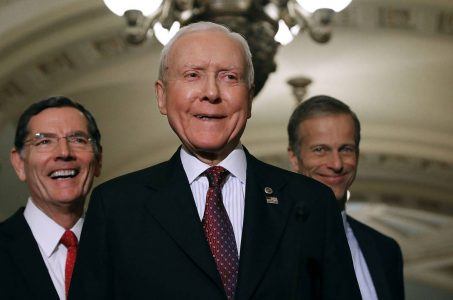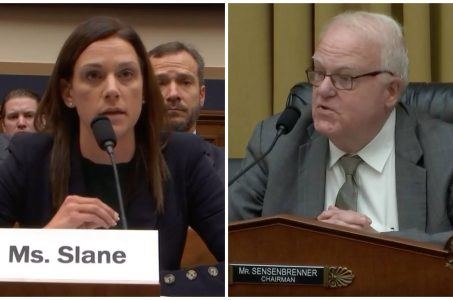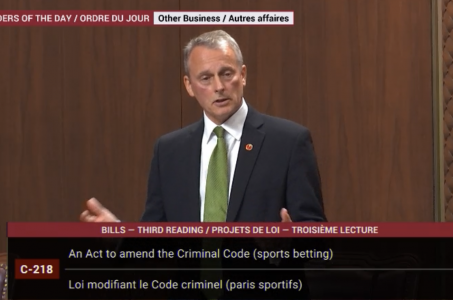California Sports Betting Gains Momentum as State Scrambles for Cash, Estimates Swell
Posted on: June 1, 2020, 10:58h.
Last updated on: June 1, 2020, 11:47h.
Staring down a budget deficit of $54 billion that policymakers claim was forced by the coronavirus, California is scrambling for ways to raise revenue, breathing new life into efforts to legitimize sports betting there in the process.

Last week, Sen. Bill Dodd (D-Napa) and Assemblyman Adam Gray (D-Merced) added implementation details to legislation they filed nearly a year ago. That would put the sports betting issue to Golden State voters on the November 2020 ballot. Alterations to California’s constitution are required for sports betting, meaning nearly one million petition signatures are required. But that effort was dealt a blow at the height of the COVID-19 pandemic.
Now, the state with some of the highest taxes in the country faces a cash crunch – one Gov. Gavin Newsom is saying will force reductions in public employee pay unless the federal government helps out. Dodd believes revenue from sports betting could help California avert budget cuts and teacher layoffs.
Policymakers face a time crunch to ensure the bill makes it to the November 2020 ballot. Two-thirds of the Democrat-controlled legislature must approve the California Sport Wagering and Consumer Protection Act before it can go the ballot. From there, a simple majority of voters must approve it to bring sports wagering to the largest state.
Compelling Forecasts
Home to the largest population in the US, 16 professional sports franchises and more than a dozen colleges that participate in Division I football, basketball, or both, California is the holy grail of the fast-growing US sports betting market, and with that status comes some scintillating estimates.
If California voters approve online and retail sports betting in November, it will open the door to a market that has the potential to generate more than $30 billion in wagers annually,” according to PlayCA.com. “Those wagers would generate some $2 billion in operator revenue and $300 million in state taxes each year.”
For his part, Dodd estimates a mature California betting market could generate $500 million to $700 million in revenue each year, with a first-year forecast of at least $200 million. However, first-year projections are just that – projections – and some states are already encountering disappointment in their initial run with legal sports wagering.
Dodd’s and Gray’s bills propose a 10 percent tax on in-person bets and 15 percent on online wagers. That’s not far off the 9.75 percent and 13 percent found in New Jersey, and it’s far better than the 36 percent levied by Pennsylvania.
Operators looking to participate in the Golden State market would be subject to a one-time licensing fee of $5 million and an annual fees of $1 million. The taxes are viewed as reasonable and experts agree the fees won’t be enough to deter operators eager to enter California.
Execution and Location
Industry observers believe should sports wagering make it to the November ballot, it will easily pass in California, though that was said of some other states where voting on the same issue was much closer than expected.
Another issue betting enthusiasts overlook with regards to California is execution. As in, the state has a poor track record of properly implementing protocols pertaining to vices. For example, the state is the largest grower of marijuana, and voters there legalized recreational cannabis in 2016. But due to high taxes and onerous fees, the Golden State’s black market for cannabis is still twice the size of its legitimate industry.
As for location, online wagering is pivotal in California because many of the state’s tribal casinos aren’t close to major cities. Dodd’s bill also allows for sports wagering at racetracks in Alameda, Los Angeles, Orange, and San Diego counties with internet accompaniments.
“Each racetrack and licensed satellite wagering facility authorized to offer sports wagering may also offer online sports wagering at one internet website each, if offered through an independent online sports wagering platform that offers sports wagering on behalf of the facility,” according to the Dodd proposal.
Related News Articles
Debate on Canadian Sports Betting Bill Likely to Resume Monday
Minnesota Sports Betting Bill Scores First Victory
Most Popular
FTC: Casino Resort Fees Must Be Included in Upfront Hotel Rates
Genovese Capo Sentenced for Illegal Gambling on Long Island
NBA Referees Expose Sports Betting Abuse Following Steve Kerr Meltdown
UPDATE: Former Resorts World & MGM Grand Prez Loses Gaming License
Most Commented
-
UPDATE: Whiskey Pete’s Casino Near Las Vegas Closes
— December 20, 2024 — 30 Comments -
Caesars Virginia in Danville Now Accepting Hotel Room Reservations
— November 27, 2024 — 9 Comments -
UPDATE: Former Resorts World & MGM Grand Prez Loses Gaming License
— December 19, 2024 — 8 Comments -
FTC: Casino Resort Fees Must Be Included in Upfront Hotel Rates
— December 17, 2024 — 7 Comments
















No comments yet